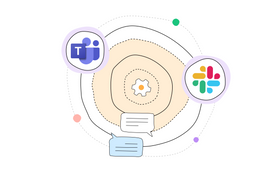Knowledge Management vs Information Management: 5 Key Differences
Despite their differences, knowledge and information management work best in synergy
Published November 5, 2023

The average worker spends almost 20% of their time searching for information. For decades, organizations have been gathering data and creating vast information networks.
Now that search engines and AI algorithms can help draw insights from this data, you can turn it into usable knowledge and information through proper management.
To better understand the differences between knowledge management vs. information management, let's explore their definitions, purposes, and the unique benefits each can bring to your business.
5 Key Differences Between Knowledge Management and Information Management
1. Scope and Focus
2. Nature of Assets
3. Purpose
4. Benefits
5. Cultural Emphasis
What Is Knowledge Management?
Knowledge management is a systematic process where a company captures and organizes its internal know-how. The process helps create actionable strategies and make information more accessible.
Beyond easily codified information that can be stored in documents, knowledge management also includes information that is harder to catalog, like tacit knowledge, expertise, and insights. The goal of capturing all this information is to enable your employees to improve their performance by accessing the knowledge.
✶ Check out these steps to developing a knowledge management strategy
What Is Information Management
Information management collects, organizes, stores, and disperses valuable data among employees. Data-driven businesses focused on record keeping frequently use it, as it helps them safely store information and change access to documents.
It covers every source of data and information in the organization—including documents, records, and repositories. Once the data is collected, the information management system determines how the information will be dispersed within the organization.
Search Made Easy
You can find all your company resources in one place with Unleash. Our AI-powered search tool allows you to access your data easily and quickly to find exactly what you need.
How Unleash makes your searches more efficient:
- Search Inside Documents: Find a file without remembering its actual file name, as Unleash brings up the most relevant results to your search inquiry.
- Advanced Filters: Get more personalized and intelligent results as Unleash learns user behavior and frequently accessed information.
- All-Around Calculator: Get instant answers for currency conversions, time zone differences, computations, temperatures, volumes, and distances.
- Search the Web: Search isn't limited to cloud-based applications and on-premise data—you can also search Google, Bing, Wikipedia, and DuckDuckGo directly from Unleash.
- Meetings: Organize and launch sessions all in one place with the calendar view.
5 Key Differences Between Knowledge Management and Information Management
1. Scope and Focus
Knowledge management has a broader scope than information management because all its assets contribute to innovation and encourage discovery.
On the other hand, information management makes accessing and retrieving documents within a system more accessible. It is more concerned with managing data and information and ensuring that records comply with regulatory standards.
2. Nature of Assets
A knowledge management system contains more assets, including employee experience, tacit knowledge, and derived insights. Information management systems only have tangible data, such as document libraries and records.
3. Purpose
Information management is meant to organize data in a way that ensures its security, accessibility, and compliance with regulations.
Meanwhile, knowledge management helps promote a learning culture where employees actively discover new knowledge and acquire expertise through sharing information.
4. Benefits
Knowledge management's benefits are improved collaboration, faster problem-solving, and more innovation. Information management brings efficient workflows, cost reduction, and data-driven decision-making.
5. Cultural Emphasis
Both concepts promote different cultural attitudes within an organization. Knowledge management fosters a culture of learning and knowledge sharing, while information management promotes a culture of meticulous record-keeping and efficient data handling.
✶ Read more about knowledge management matrix and steps to improve team performance
Integration and Synergy
Knowledge management needs information management as a suitable way to store, sort, access, and distribute information.
✶ Learn more about knowledge management and how to use it
Leveraging Knowledge and Information for Success
Choosing between information and knowledge management systems depends on your organization’s requirements. The right approach leads to more efficiency and productivity, giving your company a strategic advantage.
Unleash is an enterprise search tool that allows you to control the information in your organization and make knowledge accessible to everybody who needs it. It searches every folder and application in your company database to deliver the best results. Use Unleash to make your workers masters of knowledge management.





